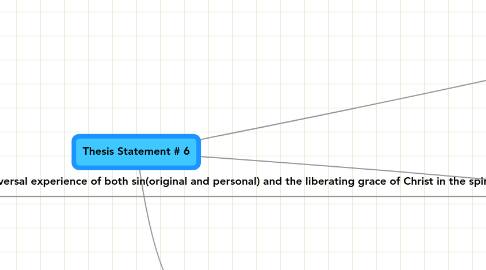
1. 1. Human freedom can refer to the capacity for self-determination, the context, the choice itself, or (fundamentally) the self formed by the three.
1.1. Capacity for self-determination
1.1.1. human freedom must be exercised in order to be. It is the capacity that creates something final, irrevocable and eternal.
1.1.1.1. freedom is not something that allows for indefinite revision of the self
1.1.2. The object chosen will determine the person. We are free to choose but we are not free to reconstitute the reality of the object chosen by us. It will stamp us with shape.
1.1.2.1. we become what we love (psalms: you are what you worship)
1.1.3. Our capacity to be self-determining has a social history that antedates us. We have inherited original sin, the misuse of freedom. This limits our capacity for self-determination
1.1.3.1. two offects
1.1.3.1.1. blurs our perception of what is good for us
1.1.3.1.2. weakens our desire for the good (corrupted desires)
1.2. feeling of freedom because of the context one is in
1.2.1. freedom does not exist apart from a particular context
1.2.2. there's no such thing as a context wherein there are an infinite number of possibilities open to one
1.2.3. freedom must face the particulars one's life is circumscribed by (be it logistically, geographically, historically, socially, etc.)
1.2.4. Every Individual's exercise of freedom changes the shape of one's neighbors freedom and vice versa -- enlarges or constricts it
1.3. The act/choice itself -- the experience of freely choosing
1.3.1. it is only in the exercise of one's freedom that one assures it. By non-exercise, one runs the risk of losing it.
1.3.2. Indetermination is the surest way of becoming unfree, because then one will be determined by choice outside oneself
1.3.2.1. The Jews of the Holocaust who would rather kill themselves than die at the Nazis' hands
1.4. The self formed by the three
1.4.1. Our choices determine who we will be and who we are determines the kind of choices that we make (mutual relation between the two)
2. 3. This process takes place within the universal experience of both sin(original and personal) and the liberating grace of Christ in the spirit.
2.1. We have inherited the misuse of freedom known as original sin
2.1.1. This wound limits our capacity for self-determination
2.1.2. this blurs our perception of what is good for us and weakening our desire to choose the good
2.1.2.1. trying to rationalize our addictions
2.2. "It is for freedom that Christ set us free"
2.2.1. In revealing God as our Creator-Redeemer-Final Goal, Christ immeasurably raised our own self-image, and in sending the Spirit He healed our powerlessness to overcome temptation and sin
2.2.2. Jesus offers to liberate us from all that oppresses humanity whether this be mental or political, individual, or social
3. 2. Moral education that begins in childhood through adulthood develops our capacity for authentic freedom.
3.1. Our capacity for self-determination and the exercise of freedom as capacity to do the good is a life-long process towards our fundamental option.
3.2. Moral education shapes the context our capacity for authentic freedom is situated in
3.3. While it is true that each person forms his/her own character but that does not exclude the fact that we are all influenced in very significantly ways by the groups, communities, and society we live in at any particular time, and by the Church also
3.3.1. While it is true that people make groups and communities, it is also a fact that in a real sense groups and communities make people
3.3.2. We are deeply moulded by the groups we belong to and usually we internalize the patterns of thinking, communicating, and behaving of these groups
3.3.3. We are influenced by the beliefs, values, virtues, and attitudes of the groups of which we are members
3.4. We are tasked to teach our children to be free
3.4.1. teaching of the Gospels
3.4.2. St. Thomas Aquinas
